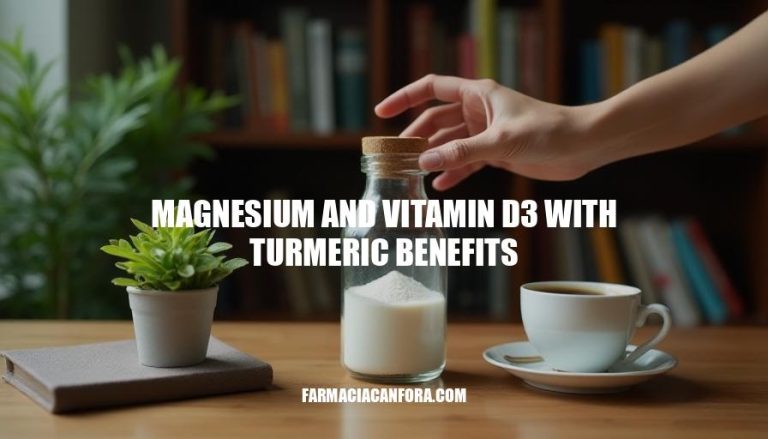


Magnesium is key for muscles and energy. It helps your body work properly by regulating many processes. Without it, you might get cramps, feel tired, or struggle with stress.
Vitamin D3 is important for strong bones and a healthy immune system. If you don’t have enough, your bones can weaken, and you might feel down. Turmeric, rich in curcumin, has amazing anti-inflammatory properties that help fight stress and support joint health.
When combined, these nutrients work together to make each other more effective.
Magnesium helps activate vitamin D3, so your body can use it properly. Vitamin D3 ensures you have enough calcium for strong bones and muscles. Turmeric’s anti-inflammatory powers also help keep everything in balance by reducing inflammation that could interfere with nutrient absorption.
Magnesium, vitamin D3, and turmeric each play essential roles in maintaining health, and their synergistic effects can be particularly beneficial in areas such as immune support, inflammation reduction, bone health, and muscle function.
Immune Support
Magnesium is critical for immune system regulation. It assists in leukocyte (white blood cell) activation and plays a role in preventing excessive inflammation that may weaken immune defenses. Vitamin D3 enhances immune response by activating T-cells, which are essential for pathogen detection and destruction.
Together, magnesium and vitamin D3 ensure an optimal immune function by promoting immune cell activation while mitigating excessive inflammatory responses.
Turmeric, specifically its active compound curcumin, exhibits strong immunomodulatory properties. It influences cytokine production, lowering pro-inflammatory cytokines such as TNF-alpha while increasing anti-inflammatory ones like IL-10. Scientific studies have shown that curcumin enhances the expression of Vitamin D receptors in immune cells, allowing vitamin D3 to be utilized more effectively in immune regulation.
Anti-inflammatory Properties
Magnesium inhibits the activity of NF-kB, a key regulator in inflammatory pathways, thereby reducing chronic inflammation. Studies have demonstrated that magnesium deficiency is linked to increased systemic inflammation. Vitamin D3 also downregulates NF-kB activity and reduces the expression of inflammatory markers such as C-reactive protein (CRP).
Curcumin, from turmeric, enhances this anti-inflammatory effect by directly interfering with inflammatory pathways and oxidative stress.
Research highlights that curcumin decreases the activity of COX-2 and LOX enzymes, reducing pain and swelling in inflammatory conditions like arthritis. In combination, magnesium and vitamin D3 support curcumin’s effects by regulating the immune system and inflammatory cascades.
Bone Health
Magnesium is fundamental to bone structure, as over 60% of the body’s magnesium is stored in bone tissue. It regulates calcium absorption and ensures bone mineralization. Vitamin D3 is well-documented for its role in calcium homeostasis, increasing calcium and phosphate absorption from the intestines and promoting bone density.
Turmeric complements these effects through curcumin’s ability to reduce oxidative damage in bone cells and suppress osteoclast activity, the process responsible for bone resorption.
Experimental studies suggest that curcumin enhances osteoblast differentiation, improving bone-building processes, particularly in the presence of vitamin D3. Magnesium optimizes vitamin D metabolism by ensuring proper enzymatic conversion into its active form, calcitriol, thus maximizing bone health benefits.
Muscle Function
Magnesium plays a crucial role in neuromuscular transmission and muscle contraction. It maintains electrolyte balance within muscle cells, reducing cramping and improving muscle recovery. Vitamin D3 is equally vital for muscle strength; deficiencies in this vitamin correlate with increased muscle fatigue and a heightened risk of falls, particularly in elderly individuals.
Curcumin enhances muscle function by improving mitochondrial efficiency and reducing exercise-induced muscle damage.
Studies indicate that curcumin supplementation lowers creatine kinase levels, a marker of muscle stress. Additionally, magnesium supports ATP production, providing the necessary energy for muscular activity, while vitamin D3 facilitates protein synthesis and neuromuscular coordination.
Scientific Findings on Synergy
Research suggests that vitamin D3 absorption is significantly improved when magnesium levels are adequate since magnesium-dependent enzymes activate vitamin D in the liver and kidneys. Studies have confirmed that magnesium deficiency impairs the conversion of vitamin D into its biologically active form, reducing its effectiveness.
Curcumin has been found to enhance vitamin D receptor expression, improving vitamin D3’s ability to regulate immune and inflammatory responses. Additionally, curcumin exhibits antioxidant properties that prevent magnesium depletion under oxidative stress conditions, ensuring that magnesium continues to support cellular function and enzymatic activity.
The combined effects of magnesium, vitamin D3, and turmeric present a strong case for their use in enhancing immune function, reducing inflammation, supporting bone health, and optimizing muscle performance.
Research continues to explore further interactions between these nutrients to uncover additional benefits in disease prevention and overall wellness.
Magnesium, vitamin D3, and turmeric are essential nutrients that work synergistically to promote overall health and well-being. The combination of these three nutrients has been shown to have numerous benefits, including:
To incorporate these nutrients into your daily health routine, consider the following practical recommendations:
Remember to consult with a healthcare professional before starting any new supplements, especially if you have underlying medical conditions or take medications. By incorporating magnesium, vitamin D3, and turmeric into your daily routine, you can experience improved overall health, reduced inflammation, and enhanced immune function.